formerly eScholarship Editions


|
|
|
|
Your search for
'Classical Religions' in subject
and
Public
in rights
found 6 book(s). | Modify Search | Displaying 1 - 6 of 6 book(s) | |
| 1. | 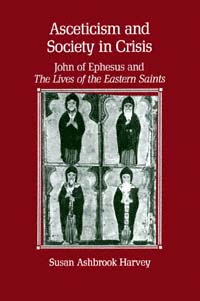 | Title: Asceticism and society in crisis: John of Ephesus and the Lives of the Eastern saints Author: Harvey, Susan Ashbrook Published: University of California Press, 1990 Subjects: Classics | Classical Religions | Classical History Publisher's Description: John of Ephesus traveled throughout the sixth-century Byzantine world in his role as monk, missionary, writer and church leader. In his major work, The Lives of the Eastern Saints , he recorded 58 portraits of monks and nuns he had known, using the literary conventions of hagiography in a strikingly personal way. War, bubonic plague, famine, collective hysteria, and religious persecution were a part of daily life and the background against which asceticism developed an acute meaning for a beleaguered populace. Taking the work of John of Ephesus as her guide, Harvey explores the relationship between asceticism and society in the sixth-century Byzantine East.Concerned above all with the responsibility of the ascetic to lay society, John's writing narrates his experiences in the villages of the Syrian Orient, the deserts of Egypt, and the imperial city of Constantinople. Harvey's work contributes to a new understanding of the social world of the late antique Byzantine East, skillfully examining the character of ascetic practices, the traumatic separation of "Monophysite" churches, the fluctuating roles of women in Syriac Christianity, and the general contribution of hagiography to the study of history. [brief] Similar Items |
| 2. | 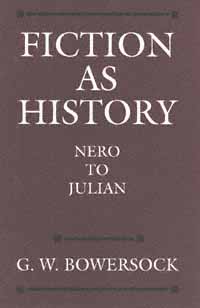 | Title: Fiction as history: Nero to Julian Author: Bowersock, G. W. (Glen Warren) 1936- Published: University of California Press, 1997 Subjects: Classics | Literature | European History | Classical Religions | Christianity | Ancient History Publisher's Description: Using pagan fiction produced in Greek and Latin during the early Christian era, G. W. Bowersock investigates the complex relationship between "historical" and "fictional" truths. This relationship preoccupied writers of the second century, a time when apparent fictions about both past and present were proliferating at an astonishing rate and history was being invented all over again. With force and eloquence, Bowersock illuminates social attitudes of this period and persuasively argues that its fiction was influenced by the emerging Christian Gospel narratives.Enthralling in its breadth and enhanced by two erudite appendices, this is a book that will be warmly welcomed by historians and interpreters of literature. [brief] Similar Items |
| 3. | 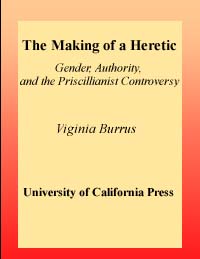 | Title: The making of a heretic: gender, authority, and the Priscillianist controversy Author: Burrus, Virginia Published: University of California Press, 1995 Subjects: Religion | Religion | Christianity | Classical Religions Publisher's Description: Silenced for 1,600 years, the "heretics" speak for themselves in this account of the Priscillianist controversy that began in fourth-century Spain. In a close examination of rediscovered texts, Virginia Burrus provides an unusual opportunity to explore heresy from the point of view of the followers of Priscillian and to reevaluate the reliability of the historical record. Her analysis takes into account the concepts of gender, authority, and public and private space that informed established religion's response to this early Christian movement.Priscillian, who began his career as a lay teacher with particular influence among women, faced charges of heresy along with accusations of sorcery and sexual immorality following his ordination to the episcopacy. He was executed along with several of his followers circa 386. His purportedly "gnostic" doctrines produced controversy and division within the churches of Spain, dissension that continued into the early decades of the fifth century.Burrus's thorough and wide-ranging study enlarges upon previous scholarship, particularly in bringing a feminist perspective to bear on the gendered constructions of religious orthodoxies, making a valuable contribution to the recent commentary that explores new ways of looking at early Christian controversies. [brief] Similar Items |
| 4. | 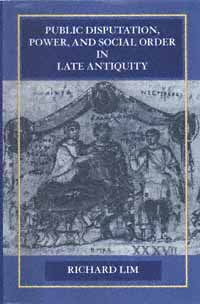 | Title: Public disputation, power, and social order in late antiquity Author: Lim, Richard 1963- Published: University of California Press, 1995 Subjects: Classics | Classical Religions | Religion | Christianity Publisher's Description: Richard Lim explores the importance of verbal disputation in Late Antiquity, offering a rich socio-historical and cultural examination of the philosophical and theological controversies. He shows how public disputation changed with the advent of Christianity from a means of discovering truth and self-identification to a form of social competition and "winning over" an opponent. He demonstrates how the reception and practice of public debate, like other forms of competition in Late Antiquity, were closely tied to underlying notions of authority, community and social order. [brief] Similar Items |
| 5. | 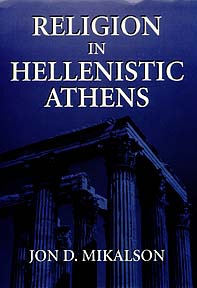 | Title: Religion in Hellenistic Athens Author: Mikalson, Jon D 1943- Published: University of California Press, 1998 Subjects: Classics | Classical Religions | Religion | Ancient History Publisher's Description: Until now, there has been no comprehensive study of religion in Athens from the end of the classical period to the time of Rome's domination of the city. Jon D. Mikalson provides a chronological approach to religion in Hellenistic Athens, disproving the widely held belief that Hellenistic religion during this period represented a decline from the classical era. Drawing from epigraphical, historical, literary, and archaeological sources, Mikalson traces the religious cults and beliefs of Athenians from the battle of Chaeroneia in 338 B.C. to the devastation of Athens by Sulla in 86 B.C., demonstrating that traditional religion played a central and vital role in Athenian private, social, and political life. Mikalson describes the private and public religious practices of Athenians during this period, emphasizing the role these practices played in the life of the citizens and providing a careful scruntiny of individual cults. He concludes his study by using his findings from Athens to call into question several commonly held assumptions about the general development of religion in Hellenistic Greece. [brief] Similar Items |
| 6. | 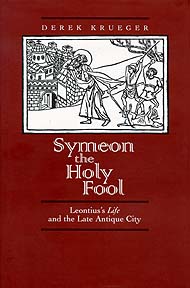 | Title: Symeon the holy fool: Leontius's Life and the late antique city Author: Krueger, Derek Published: University of California Press, 1996 Subjects: Religion | Literature | Christianity | Classics | Classical Religions Publisher's Description: This first English translation of Leontius of Neapolis's Life of Symeon the Fool brings to life one of the most colorful of early Christian saints. In this study of a major hagiographer at work, Krueger fleshes out a broad picture of the religious, intellectual, and social environment in which the Life was created and opens a window onto the Christian religious imagination at the end of Late Antiquity. He explores the concept of holy folly by relating Symeon's life to the gospels, to earlier hagiography, and to anecdotes about Diogenes the Cynic.The Life is one of the strangest works of the Late Antique hagiography. Symeon seemed a bizarre choice for sanctification, since it was through very peculiar antics that he converted heretics and reformed sinners. Symeon acted like a fool, walked about naked, ate enormous quantities of beans, and defecated in the streets. When he arrived in Emesa, Symeon tied a dead dog he found on a dunghill to his belt and entered the city gate, dragging the dog behind him. Krueger presents a provocative interpretation of how these bizarre antics came to be instructive examples to everyday Christians. [brief] Similar Items |